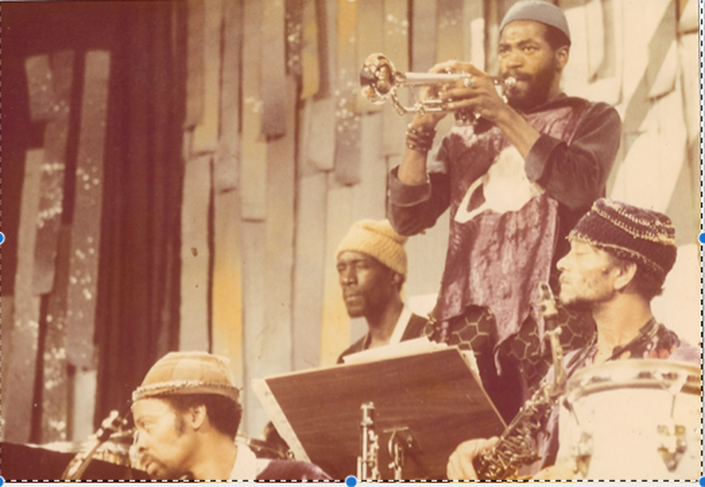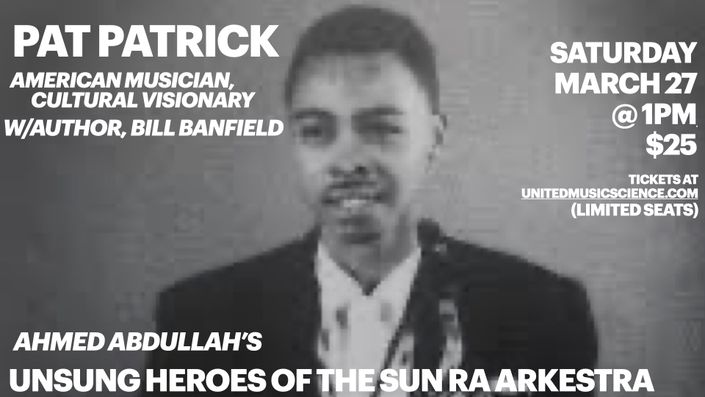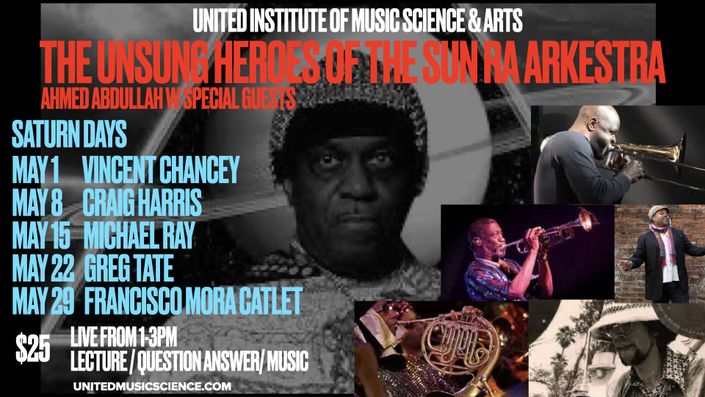Limited Free Bonuses
Unsung Heroes of the Sun Ra Arkestra
Complete course FREE
($999 regular price )
First Ten Enrollments will also get
"A Strange Celestial Road' 512 pages personally autographed by Ahmed Abdullah

A STRANGE CELESTIAL ROAD
Personally Autographed by Ahmed Abdullah
(Limited to first ten enrollments)
In this memoir, Harlem-born trumpeter Ahmed Abdullah recounts decades of national and international touring with the Sun Ra Arkestra and charts the rise of the New York loft jazz scene, offering a fascinating portrait of advanced music in Brooklyn and Lower Manhattan from the 1970s through the 1990s, including thrilling stories about the politically important Bed-Stuy venue The East and the author's tutelage under composer and long-time Archie Shepp collaborator Cal Massey. Along the way, Abdullah covers his spiritual development as a Buddhist, battles with addiction, tribulations as a father, lessons from Sun Ra and working life as an educator and cab driver.
512 pages. Paperback.
About the Author
Trumpeter and educator Ahmed Abdullah was born in Harlem in 1947. An important figure in the New York loft jazz movement, in 1972 he formed a group called Abdullah, two years before joining the Sun Ra Arkestra, with whom he played for more than 20 years. He is a founding member of the bands Melodic Art-Tet, The Group and NAM, and of the Central Brooklyn Jazz Consortium. Abdullah is the music director at Sistas' Place in Brooklyn, and teaches music at the New School for Social Research in Manhattan and an elementary school in Bed-Stuy, Brooklyn.

Ahmed Abdullah
Ahmed Abdullah's immersion into the pulsating heart of Harlem's historic milieu laid the creative foundation for a lifetime interwoven with jazz and Afrofuturism. Encounters with transformative figures like Malcolm X and Langston Hughes, alongside the ever-present sounds of street-corner jazz, channeled through him a deep comprehension of the music's spiritual and societal dimensions. As a member of the Sun Ra Arkestra and a trailblazer of collectives like the Melodic Art-Tet, he has lived the philosophy he now imparts to his students. His ongoing engagements as a performing artist, educator, and thinker deeply enrich the course, ensuring an authentic, lived-through perspective on the cultural legacy of Sun Ra and the evolving narrative of Afrofuturism.
Transcending the realm of performance, Ahmed's pedagogical journey weaves together decades of expertise with unwavering passion for the subject matter. Through his teaching, he fosters a vibrant classroom environment where the spirit of jazz is not only dissected but also felt, drawing upon his experiences leading ensembles like Diaspora and his contributions to pivotal cultural establishments such as Sistas’ Place. As an actively engaging educator, he invites students to explore the profound layers of jazz as a transcendental force that continually reshapes our understanding of art, identity, and community in a future-forward discourse.
Course Curriculum
- Who is Sun Ra?
- Students are exposed to Sun Ra's life in relation to Afro-Futurism and Music of the Spirit. They also learn about the other 8 progenitors of Music of the Spirit and the 9 principles extracted from their collective lives. The Music of Sun Ra, exemplyfing the class is listened to and discussed.

The Course
Dive deep into the cosmic philosophy and musical ingenuity of one of the most enigmatic figures in jazz - cue the interstellar grooves, we're exploring the universe of sound and spirit through the lens of Afrofuture thinking. This isn't just a history lesson; it's a journey through the space-time continuum where music serves as our spaceship. You'll get to understand how cultural, historical, and spiritual elements fuse to create a genre that defies convention, examining the societal impact of the creative genius and how his work blurs the lines between past and future, reality and fiction.
Now, imagine flexing your intellectual muscles while tapping your feet to some otherworldly beats – that's what you're signing up for! By the end of our adventure, you won't just be loaded with knowledge about improvisation, cultural resistance, and visionary artistry; you'll also grasp the practical magic of using music as a tool for self-expression and social change. Whether you're a music buff, a history aficionado, or just someone looking to expand your mind, getting your groove on with this course will equip you with a fresh perspective on how to engage with the world creatively and courageously.





